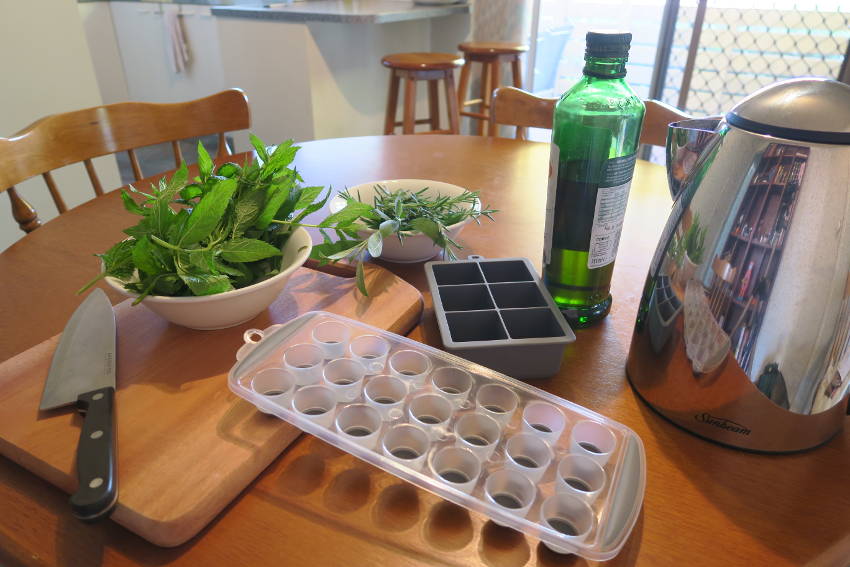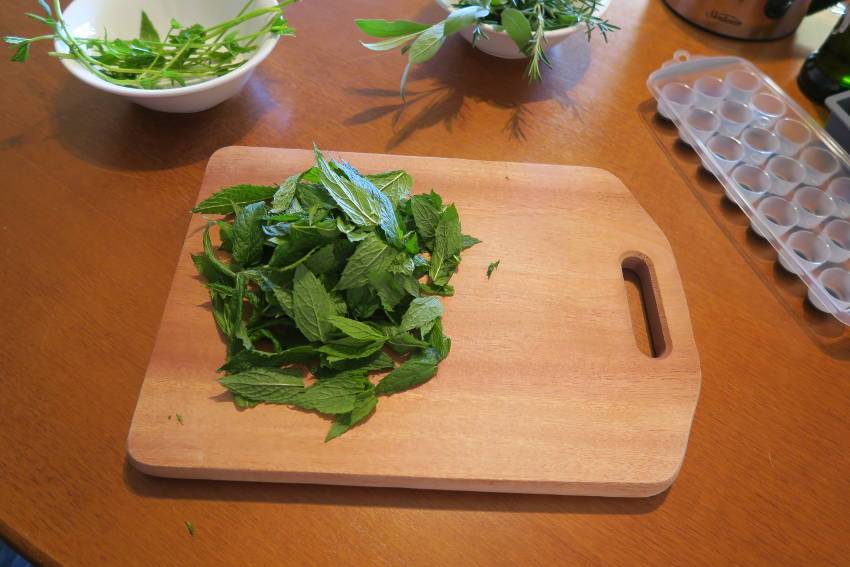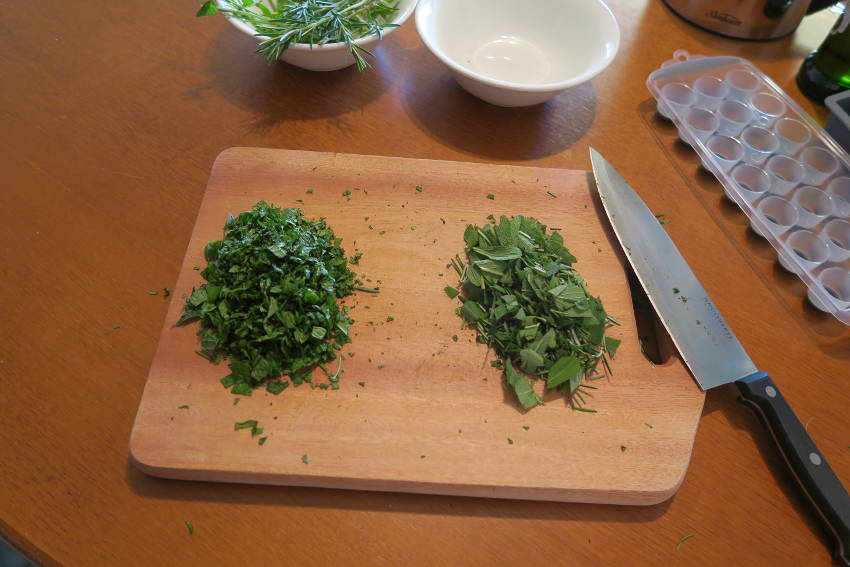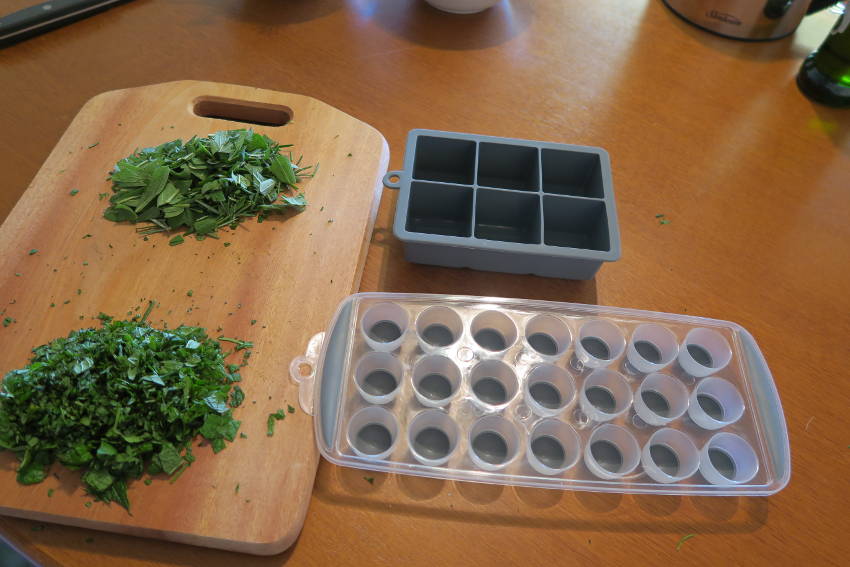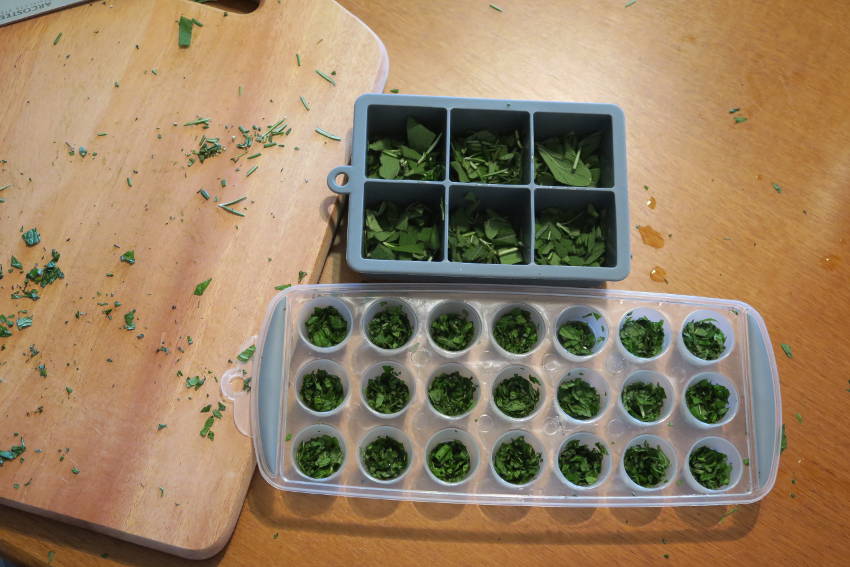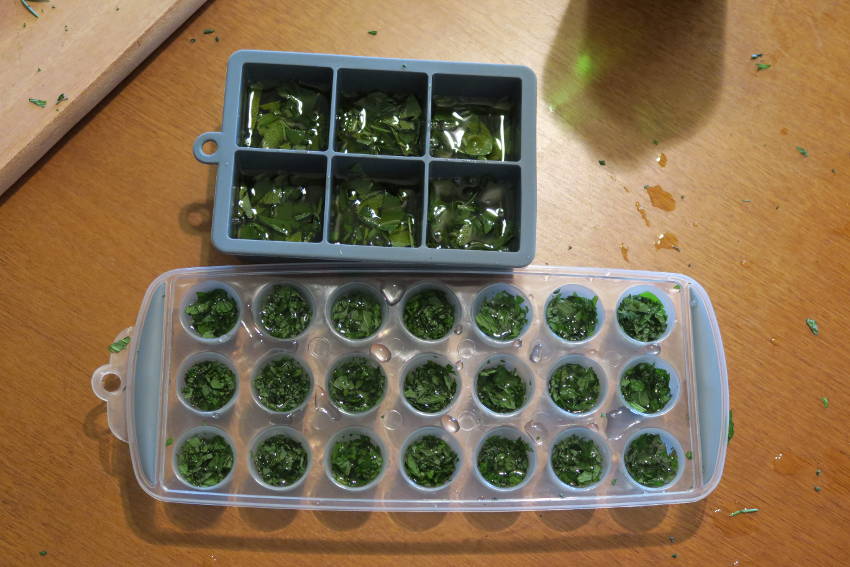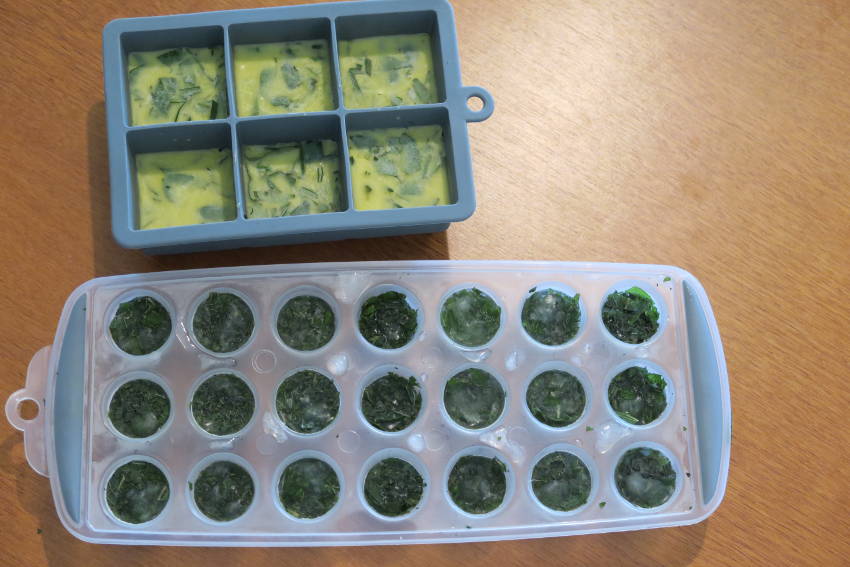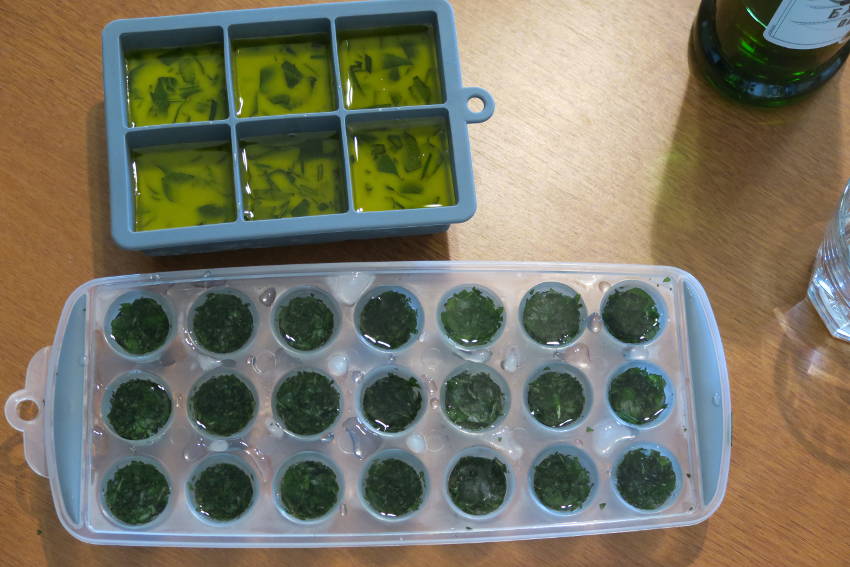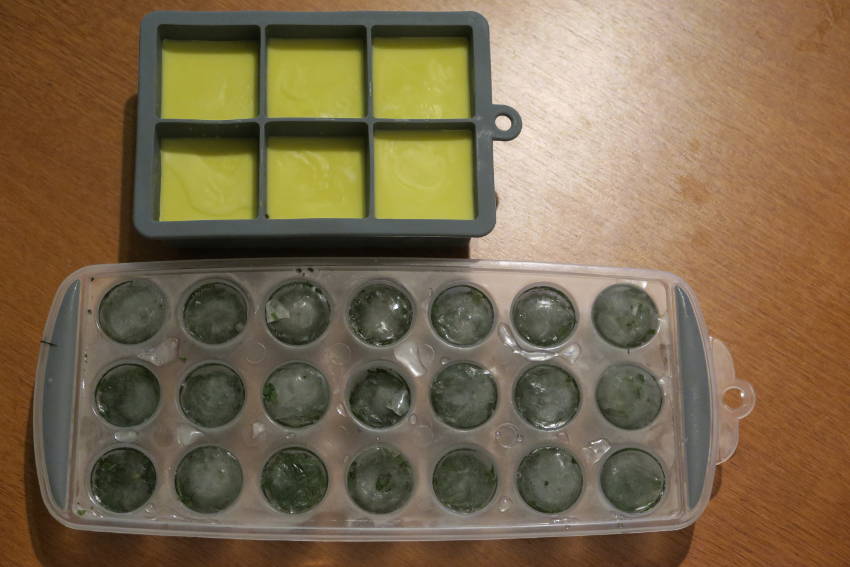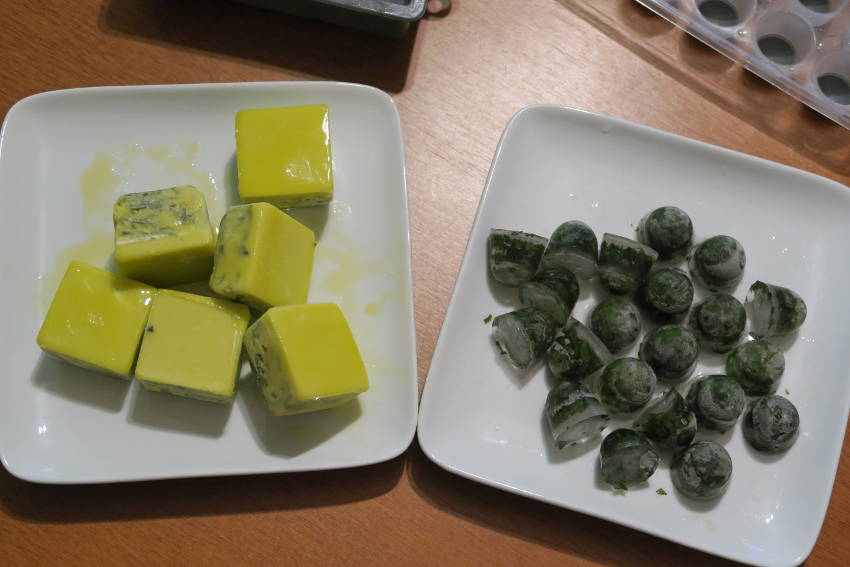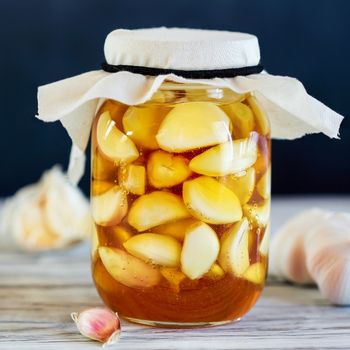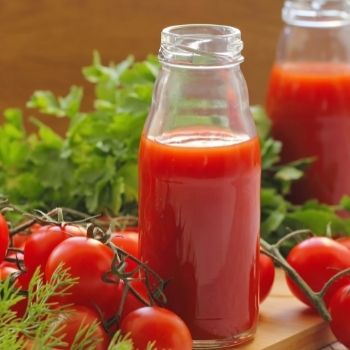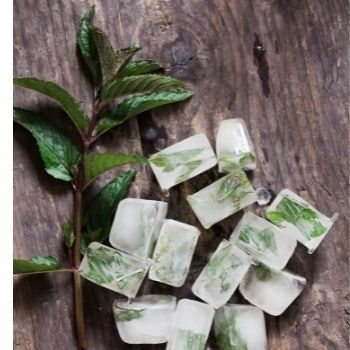One of the most satisfying things about growing herbs is the abundance it brings to your kitchen in a successful summer. But the season only lasts so long, and there's only so many fresh herbs you can use during those few months.
Preserving is the time-honoured choice for spreading your herb harvest through to the colder months. Dried herbs, infused vinegar, and herbal oils all have their place.
But one of the simplest and most effective methods of preserving your home-grown herbs is to freeze them into ice cubes, creating a handy and thrifty kitchen ingredient to use all year round.
Why Make Ice Cubes with Fresh Herbs?
Freezing herbs in cubes adds several advantages to the practical benefits of other preserving methods.
- You don't need any preserving experience or special equipment. Success is all but guaranteed.
- While no preserving process retains the texture of fresh herbs, this method comes closest to keeping the original flavour intact.
- This makes the preserved herbs more flexible in cooking, without the process imparting its own distinctive taste.
- And you can use the frozen herbs in the same quantities as fresh in recipes where precise measurements count.
- Depending on your available freezer space, it's easy to preserve large or small amounts in convenient cooking portions.
Which Herbs Best Suit This Method?
Some herbs are more suitable for the ice treatment than others.
Soft herbs such as basil, dill, and coriander can lose their flavour more quickly than harder herbs. This is because their higher water content leeches the essential oils into the cubes during the freezing process. You may also find the flavour slowly becomes more bitter or grassy the longer you keep them.
More robust, woody herbs such as rosemary, thyme, and sage are much more successful thanks to their higher oil content. They can even benefit from the long, slow infusion process which softens their flavour profile.
As a rule of thumb, if you'd cook the fresh or dried herb for more than a few minutes then this is a good preservation method. If a recipe calls for the fresh herb to be added right at the end or as a garnish, the flavours will be less successful.
How to Make Herbal Ice Cubes
You can freeze the herbs in either boiling water or a light cooking oil. Each has its benefits and drawbacks, but the basic method is the same.
- Pick good quality, undamaged herbs which are as fresh as possible. Wash and pat dry if necessary.
- Finely chop or mince your herbs, stripping the leaves off the stems for woodier varieties.
- Add measured amounts of herbs to each section of the tray, up to no more than two-thirds full.
- Add liquid to just cover the herbs, leaving a little space below the rim. The herbs might float, especially if you're using water. If so, press them down to cover as much as possible, but don't worry about this too much.
- Cover the tray and freeze for several hours or overnight.
- When solid, top up the frozen cubes with liquid to fully submerge any floating herbs, and return to the freezer.
- Once completely frozen, transfer the finished cubes to labelled zip-lock bags or containers. Remember to include the herb type, its freezing liquid and the date on the label. (I.e. Rosemary Olive Oil 13/11/18)
The herb cubes will store in a freezer for several months without harm, or up to a year with increasing loss of flavour. But in any case, you can discard them once your fresh herbs come back on stream next year.
Choosing Between Water and Oil
Water and oil both have their advantages and disadvantages.
Water:
- Quick, easy, and economical.
- Offers a neutral flavour for greater flexibility in later cooking.
- Fewer calories.
- The herbs can be damaged by freezer burn, and have a shorter freezer life.
Oil:
- Reduces damage and deterioration from freezer burn.
- Better maintains the herbs' original colour.
- The flavour diffuses into the oil for greater intensity in the final dish.
- Oil-based cubes don't spit as much when added to a hot pan.
- Oil cubes melt faster than water ones, so herbs cook more quickly and evenly, preserving their flavour.
- However, your choice of oil can be limit the cubes' use in a final dish. For example, basil in olive oil is perfect for a pasta sauce, less so for a Thai green curry.
Using the Cubes
Using the frozen herb cubes is simplicity itself. For soups, stews, and other wet dishes, simply grab a cube from the freezer and melt it into the dish. Oil-based cubes are suitable for frying up a base for casseroles or pasta sauces. Water-based cubes are more suited to adding later in a recipe, at the same stage as other liquids.
Cubes made with fragrant herbs such as lemon balm, lemon verbena, or mint make a great alternative to a regular ice cube for a refreshing drink.
And lastly, aromatic herbs frozen in oil make a great basis for a speedy salad dressing.
Tips and Tricks
The basic method is simple and works perfectly well. However, there are several tips and tricks you can use to make the most of the technique.
- Use only the freshest undamaged herbs. Poor-quality herbs will lose their flavour more quickly during the freezing process.
- Use a measured spoonful of herbs in each cube to make using them in recipes easier later on.
- If you regularly use a particular herb mixture in a recipe, freeze ready-mixed cubes for an instant flavour fix.
- If you're using water, add it when boiling to blanch the herbs in the tray. This will help preserve their colour and flavour.
- For added interest, use a stock, broth, or even a jus instead of plain water. This will, of course, put limits on how you later use the herbs.
- If using oil, choose a neutral one for maximum flexibility. However, if olive oil is a mainstay of your kitchen, it produces great results.
- Replace the oil with butter for extra-luxurious cubes, but make sure you use unsalted butter which has better freezing qualities.
- Use dedicated ice cube trays for freezing your herbs so that your ordinary ice cubes don't pick up any unwanted flavours.
- To preserve larger amounts of herbs, it might be easier to blitz a whole bunch in oil or water first and then freeze the paste. However, if you do this you'll lose the benefit of easy measurement.
Nothing beats the intense, fresh flavour of herbs picked directly from your garden. But summer can't last forever. Freezing your herb harvest in cubes is the easiest and quickest way to preserve its tastes deep into the winter months.
Below: Step by step photos of the herbal ice cube method. Preserving spearmint in water, and sage and rosemary in olive oil.


